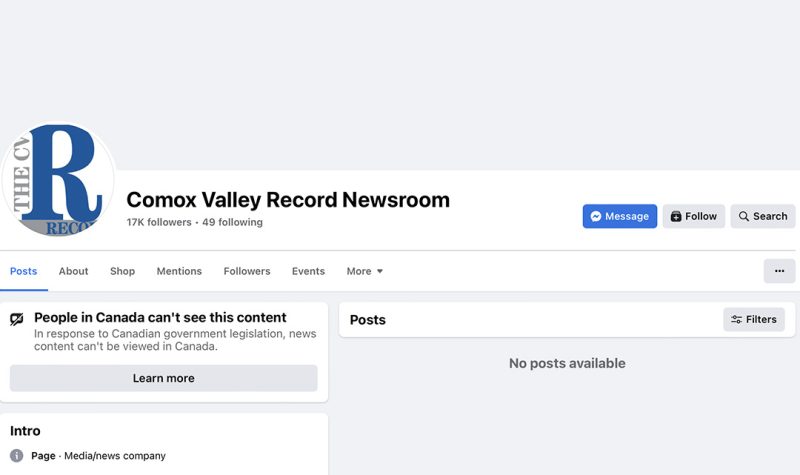Online News Act regulations released by federal government
Courtenay city council voted to accept a staff report at their meeting on Wednesday that recommended that the city continue advertising on Facebook and Instagram as parent company Meta continues to block news in Canada.
This was in response to a letter from the publisher of the Comox Valley Record that asked the city to boycott advertising on Meta.
Meta started blocking news on Facebook and Instagram after the federal government passed the Online News Act in June, which requires large tech companies like Meta and Google to make agreements with Canadian media organizations in exchange for sharing their content on the platforms.
On Friday, the federal government released regulations for the Online News Act that outlined how much tech companies would have to pay under the new law.
Google would have to offer $172 million and Facebook would have to pay $62 million in compensation to Canadian news organizations.
The regulations limit the act to companies that have a total global revenue of $1 billion or more a year and have 20 million unique visitors or active users a month.
Instagram is not affected under the new regulations but Meta continues to block news content on that platform as well as on Facebook.
According to the staff report the City of Courtenay spent 19 times more on newspaper advertising compared to Meta.
A total of $136,285 was spent on advertising with Black Press from 2021 to the first half of 2023 while spending $7,163 advertising with Meta on Facebook in the same period.
Coun. Doug Hillian said he was sympathetic to local media being blocked but Meta was a key way the city uses to reach people online.
“This seems to me like a classic double bind,” he said. “I have great sympathy for our news organizations and all those who are held in the thrall of these manipulative social media giants. But at the same time, it's a pretty essential communications tool. So what are you going to do?”
Coun. Hillian mused about the possibility of the city taking out an ad or open letter in the local paper asking readers to voice their opinion with the tech companies, but that idea was not adopted by council and was “something that would take a little more time to craft and we would have here tonight.”
Coun. Wendy Morin said she understands people’s frustration with not being able to access local news on Facebook instead getting a message that reads “In response to Canadian government legislation, news content can't be viewed in Canada.”
“It's pretty strange,” she said. “Now, when you just automatically go to a media site to check something and then you get that message. It's just blank now and it really does have an impact.”
Coun. Evan Jolicoeur raised the issue about how people can’t access news stories about emergencies like the wildfires that have been raging across BC through Facebook.
“With the wildfires, after decades of individuals [and] communities receiving their news through their social media channels, and no longer being able to access news and notifications around what's happening in their communities to protect their safety.”
Alex Freedman, executive director of the Community Radio Fund of Canada, says that municipalities rely on local news coverage of city council meetings.
“We have this important need for local journalism and one way right now that local governments can stand up and say we really support this kind of journalism is by saying, ‘Dear Google and Facebook until you start paying for the news you use, we're not going to advertise on your service.'”
Listen to CHLY's report below:


